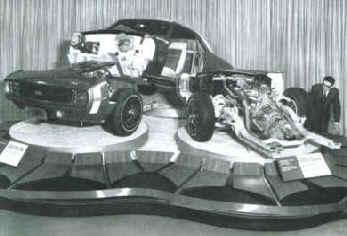|
 This
creation of the Chevrolet Show & Display Department (now known
as GM Creative Services), one of hundreds of exhibits produced and
seen by tens of millions each year, was produced in mid 1968
primarily in the Detroit Michigan facility (called “440” for
short). Eight of the very first 69 Camaro bodies produced by
Fisher (ours is within the first 50 VIN’s) were identically
modified for promotional use, seen at the Detroit Auto Show and
countless media, dealership and show events, to promote the then
new Camaro body style and innovations.
Seven of these “Double Header” Camaro Exhibits toured
and remained in the USA....one was sent to tour the Australian
continent where Camaro’s were then, and remain today....hot!
Each car and its massive display assembly (the electric
motor powering the display assembly weighed nearly 2,000 pounds
alone) was transported in its own specially marked GM 18 wheeler.
In the late sixties, Show & Display used a fleet of 33
tractor-trailer rigs and an additional 200 van loads by commercial
carrier to support Chevrolet road tours. This
creation of the Chevrolet Show & Display Department (now known
as GM Creative Services), one of hundreds of exhibits produced and
seen by tens of millions each year, was produced in mid 1968
primarily in the Detroit Michigan facility (called “440” for
short). Eight of the very first 69 Camaro bodies produced by
Fisher (ours is within the first 50 VIN’s) were identically
modified for promotional use, seen at the Detroit Auto Show and
countless media, dealership and show events, to promote the then
new Camaro body style and innovations.
Seven of these “Double Header” Camaro Exhibits toured
and remained in the USA....one was sent to tour the Australian
continent where Camaro’s were then, and remain today....hot!
Each car and its massive display assembly (the electric
motor powering the display assembly weighed nearly 2,000 pounds
alone) was transported in its own specially marked GM 18 wheeler.
In the late sixties, Show & Display used a fleet of 33
tractor-trailer rigs and an additional 200 van loads by commercial
carrier to support Chevrolet road tours.
The 69 Camaro
“Double Header” exhibit originally rotated in sections on
three turntable displays. The rear turntable mounted the body
which could raise and lower, pivoting on the rear axle, and also
swivel to the left or right. The two front turntables, one with an
RS/SS-350 front nose section, disc brake subframe, 350 cut-away
engine and TH-350 trans, and the second with a Standard nose
section, drum brake subframe, 6 cyl cut-away engine and powerglide
trans, would make 360 degree rotations.
Both cut-away engine’s internals were turning, showing a
fully functioning engine, spun slowly by electric motors neatly
disguised as the alternator.
When activated by a spectator pushing a button, the
uplifted body would rotate, index with a now stopped and correctly
positioned turntable, then lowered down onto either the RS/SS-350
front end or the Standard 6 cylinder front end to form a complete
69 Camaro! Headlamps
and parking lights would flash, the horn would sound, and on the
RS, the hideaway headlamp doors opened and closed. Upon command,
the whole process would repeat itself.
 |
 |
|
The
Double Header's resting place in Australia. Photo's from the
CarsinBarns website. |
|
|

|
New photo set of the Double-Header display car taken sometime in 1978 in Australia. The owner had hoped to build a drag car. We're glad he didn't get much further. Even then you can note the extensively dented body shell.
Continue
Back
|